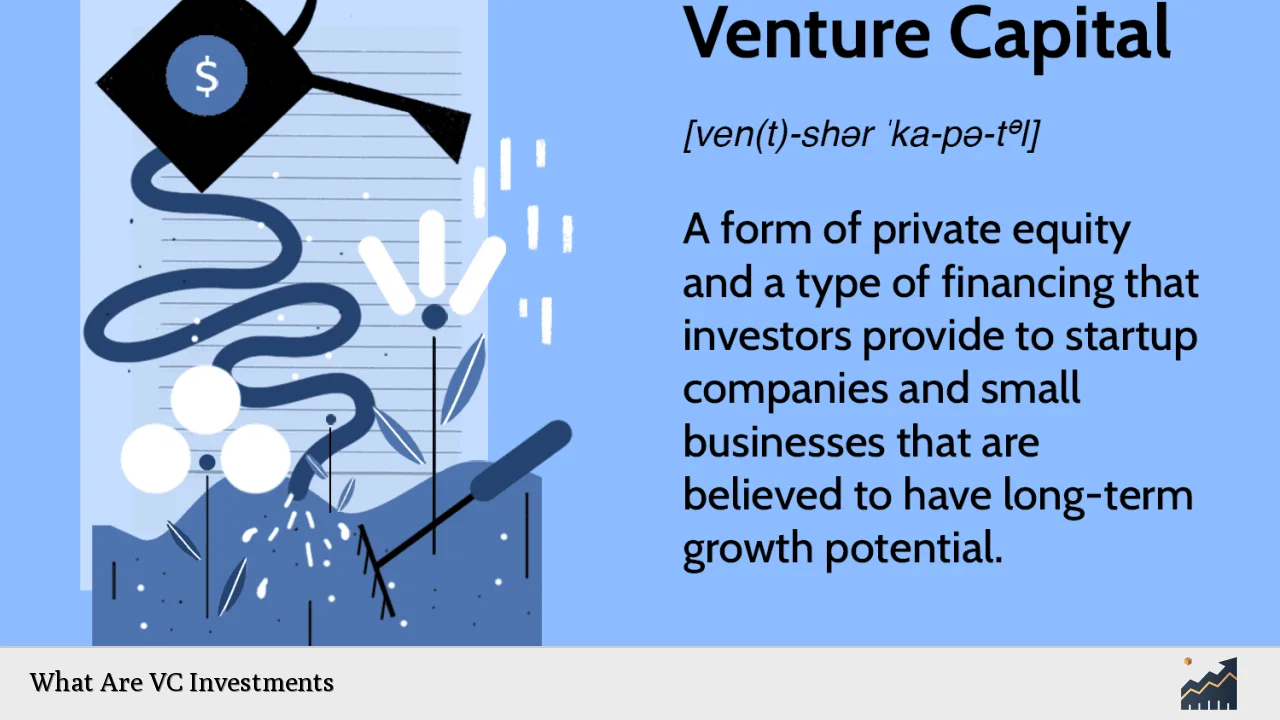Venture capital (VC) investments are a form of private equity financing specifically aimed at startups and small businesses that exhibit high growth potential. This financing is crucial for early-stage companies that often lack access to traditional funding sources like bank loans or public equity markets. Venture capitalists provide not only capital but also strategic guidance, mentorship, and networking opportunities to help these businesses thrive.
In essence, VC investments are about taking calculated risks. Investors put money into companies in exchange for equity, hoping that the startups will grow significantly and yield substantial returns. This investment model is characterized by a high risk of failure, as many startups do not succeed. However, successful investments can lead to significant financial rewards, especially when companies go public or are acquired.
| Aspect | Description |
|---|---|
| Definition | A type of private equity focused on high-growth startups. |
| Investment Type | Equity financing in exchange for ownership stakes. |
| Risk Level | High risk with potential for high rewards. |
| Typical Stages | Seed, Series A, B, C funding rounds. |
Understanding the Venture Capital Process
The venture capital process involves several key stages that guide both investors and entrepreneurs through the funding landscape.
The Funding Stages
- Pre-Seed Stage: This is the earliest phase where entrepreneurs seek initial funding to develop their ideas. This funding often comes from personal savings, family, friends, or angel investors.
- Seed Stage: At this stage, companies require more substantial funds to develop their products or services. Seed funding helps validate business concepts and prepare for market entry.
- Series A Funding: Once a startup has a viable product and initial traction, it seeks Series A funding to scale operations. This round typically involves larger amounts of investment from venture capital firms.
- Subsequent Rounds (Series B, C, etc.): As the company grows, it may go through additional funding rounds to support further expansion and development.
Each stage represents a critical point in the startup’s growth trajectory where specific financial needs must be met to ensure continued progress.
Role of Venture Capitalists
Venture capitalists play a multifaceted role in the ecosystem:
- Financial Support: They provide the necessary capital to help startups grow.
- Mentorship: VCs often bring valuable industry experience and insights that can guide young companies in making strategic decisions.
- Networking Opportunities: They connect entrepreneurs with potential partners, customers, and other investors.
- Governance: In exchange for their investment, VCs may demand board seats or other governance rights to influence company direction.
This active involvement helps mitigate risks associated with startup failures while enhancing the likelihood of success.
Advantages of Venture Capital Investments
Venture capital offers numerous benefits for both startups and investors.
For Startups
- Access to Capital: VC investments provide essential funds that enable startups to scale operations and develop products without immediate pressure for repayment.
- Expert Guidance: Entrepreneurs benefit from the expertise of seasoned investors who can help refine business strategies and navigate market challenges.
- Increased Credibility: Securing venture capital can enhance a startup’s reputation, making it easier to attract additional investment and talent.
For Investors
- High Return Potential: Successful VC investments can yield substantial returns when companies go public or are acquired.
- Portfolio Diversification: Investing in venture capital allows investors to diversify their portfolios with high-risk assets that may not correlate with traditional markets.
- Driving Innovation: VC investments support cutting-edge technologies and business models, contributing to economic growth and job creation.
The symbiotic relationship between venture capitalists and startups fosters innovation while providing financial backing necessary for growth.
Disadvantages of Venture Capital Investments
Despite its benefits, venture capital also comes with several drawbacks that both startups and investors should consider.
For Startups
- Loss of Control: Entrepreneurs may have to relinquish some control over their company as VCs often demand significant equity stakes and influence on decision-making processes.
- Pressure for Quick Returns: Venture capitalists typically seek rapid growth and may pressure startups for quick exits through acquisitions or IPOs.
For Investors
- High Risk of Failure: Many startups fail, leading to potential losses for investors who may not see returns on their investments.
- Illiquidity: VC investments are often illiquid; funds are tied up for several years before any returns can be realized through exits.
Understanding these advantages and disadvantages is crucial for both parties involved in venture capital transactions.
The Impact of Venture Capital on Innovation
Venture capital plays a vital role in driving innovation across various sectors. By funding startups that focus on groundbreaking technologies and services, VCs contribute significantly to economic development.
Economic Contributions
- Job Creation: VC-backed companies are major contributors to job creation as they grow rapidly and expand their operations.
- Technological Advancements: Many innovations we see today stem from venture-funded projects that have disrupted traditional industries, leading to enhanced productivity and efficiency.
The impact of venture capital extends beyond individual companies; it stimulates broader economic growth by fostering competitive markets filled with innovative solutions.
FAQs About VC Investments
- What is venture capital?
Venture capital is a type of private equity financing provided to early-stage companies with high growth potential. - How does venture capital work?
VC firms invest in startups in exchange for equity stakes, providing both financial support and strategic guidance. - What are the stages of venture capital funding?
The stages include pre-seed, seed, Series A, B, C funding rounds. - What are the benefits of venture capital?
Benefits include access to significant funds, expert mentorship, increased credibility, and high return potential. - What are the risks associated with venture capital?
The risks include loss of control for founders and a high likelihood of startup failure.
Venture capital investments represent a crucial mechanism for fostering innovation and supporting the growth of new businesses. While they come with inherent risks, the potential rewards make them an attractive option for both entrepreneurs seeking funding and investors looking for high-return opportunities.

